
Israeli fighter jets launched a series of targeted strikes across southern Lebanon on Wednesday, marking one of the most significant escalations in cross-border hostilities since tensions began simmering earlier this month.
The aerial assault focused on multiple towns throughout the region, with Lebanese security sources confirming substantial damage to infrastructure and property. The attacks represent a dramatic intensification of what had previously been near-daily exchanges of fire between Israeli forces and Hezbollah militants.
Expanding Conflict Zone
According to military analysts, the scope and scale of Wednesday's operations suggest a strategic shift in Israel's approach to the northern front. Rather than limited retaliatory strikes, the coordinated jet attacks indicate a more aggressive posture toward neutralizing perceived threats from Lebanese territory.
Security officials report that the strikes targeted what Israel describes as Hezbollah military installations and launch sites. The Lebanese militant group has been engaged in regular rocket and artillery fire toward northern Israeli communities, prompting increasingly forceful responses from the Israeli Defense Forces.
Regional Implications
The escalating violence raises concerns about a potential second front opening in Israel's ongoing security challenges. With attention already focused on Gaza in the south, the intensified operations in Lebanon suggest military planners are preparing for prolonged engagement on multiple borders.
Civilian populations on both sides of the border have been forced into bomb shelters repeatedly in recent weeks, with Wednesday's airstrikes generating the most widespread alarm yet among residents of southern Lebanese villages.
International Response
Diplomatic channels are buzzing with activity as world leaders monitor the deteriorating situation. United Nations peacekeeping forces in southern Lebanon have called for immediate de-escalation, while Western governments are urging restraint from all parties involved.
The Canadian government has yet to issue an official statement regarding the latest developments, but Global Affairs Canada is known to be closely monitoring the safety of Canadian citizens in both Israel and Lebanon.
What Comes Next?
Military experts suggest several possible scenarios could unfold:
- Continued tit-for-tat exchanges without full-scale war
- Expanded Israeli operations against Hezbollah infrastructure
- International mediation leading to temporary ceasefire
- Further escalation drawing in additional regional actors
The coming days will be critical in determining whether the conflict remains contained or spirals into a broader regional confrontation. With both sides demonstrating increased willingness to employ advanced military assets, the risk of miscalculation grows exponentially.






